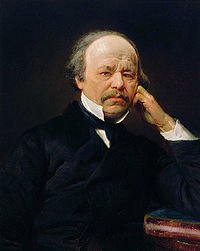Aleksander Dargomyżski - St. Petersburg Serenades for Choir
Alexander Dargomyzhsky – St. Petersburg Serenades for Choir

01. From a Far Away Country (Из страны, страны далекой) 1:33 02. Where Is Our Rose ? (Где наша роза) 2:01 03. Raven Flies To Raven (Ворон к ворону летит) 1:02 04. Come To Me (Приди ко мне) 2:03 05. Beautiful Summer (Вянет, вянет лето красно) 2:35 06. Mary (Пью за здравие Мери) 1:02 07. In the Wild North (На севере диком) 2:05 08. On The Calm Waves (По волнам спокойным) 1:26 09. The Midnight Wood Goblin (В полночь леший) 1:26 10. Beautyful Day (Прекрасный день, счастливый день) 2:21 11. The Storm Cover The Skay (Буря мглою небо кроет) 3:05 12. They Say There Is The Country (Говорят, есть страна) 1:17 13. Was has the voice of cheer stopped? (Что смолкнул веселия глас) 2:20 St. Petersburg Choir Klavdia Ptitsa – Choir Master
Alexander Dargomizhsky was born in dramatic circumstances on one of the estates of his father, a wealthy landowner in the Smolensk area, as the family had fled there to avoid the invading French Army under Napoleon. His mother was a minor poetess named Princess Kozlovskaya who disliked music. Nevertheless, three of her children had musical careers.
As a boy he had many ailments and did not speak until he was five years old. He received the ordinary training of a young aristocratic youth, including music lessons. He was much in demand as a pianist in society gatherings. He also studied violin, but apparently never mastered intonation (according to his violinist brother, Viktor).
He became a government official in 1827 and was promoted regularly. After he met Mikhail Glinka he decided to make music his vocation and studied harmony and composition by borrowing Glinka's notebooks from his studies in Berlin. He became interested in opera. After giving up his first project, he completed Esmeralda, based on Victor Hugo, by 1841. It was not produced until 1849, and while admired for its choral scenes, it was revived in 1851, but not restaged for another 50 years, and has never caught on. It is in a French grand opera fashion that already was outdated by then.
He wrote a large number of songs, mostly for female voice, and many of these became popular. He resigned his government position and went abroad. He came back with a new nationalistic feeling and started studying Russia's folk music and its typical speech intonations, imitating these in his music. His opera Rusalka, finished in 1855, is a result of this interest; it is written in a new, natural declamatory style. He wrote a famous article decrying the Italian-style interest in "melodies flattering to the ear" and proclaimed the ideal of expressing the word "directly" and truthfully.
This led to his composition of The Stone Guest, a nearly direct, word-for-word setting of Pushkin's play. It was written in continuous melodic recitative, with a accompaniment mainly of chords. In 1867 he was elected president of the Russian Musical Society. The duties of that position and his frail health did not permit him to finish The Stone Guest. The few remaining portions of the vocal score were completed by César Cui and orchestrated by Rimsky-Korsakov. It has never been a theatrical success; only Rusalka is staged with any regularity, even in Russia.
Dargomizhsky's main musical legacy, therefore, is his songs, along with a few orchestral and instrumental pieces. It is his ideas about musical drama that give him an important position in Russian music, and his finding and setting folk tunes. This directly influenced Mussorgsky, who used natural Russian declamation in his operas, and through him later Russian composers, especially Shostakovich and Britten (whose operatic career was given inspiration by Shostakovich's Lady Macbeth of Mtsensk District) and Janácek. Outside of Russia, where he is regarded as an important composer in his own right, he is mainly valued for these influences. --- Joseph Stevenson, Rovi
download: uploaded anonfiles gett yandex 4shared solidfiles mediafire mega filecloudio
Zmieniony (Wtorek, 22 Październik 2013 10:38)
